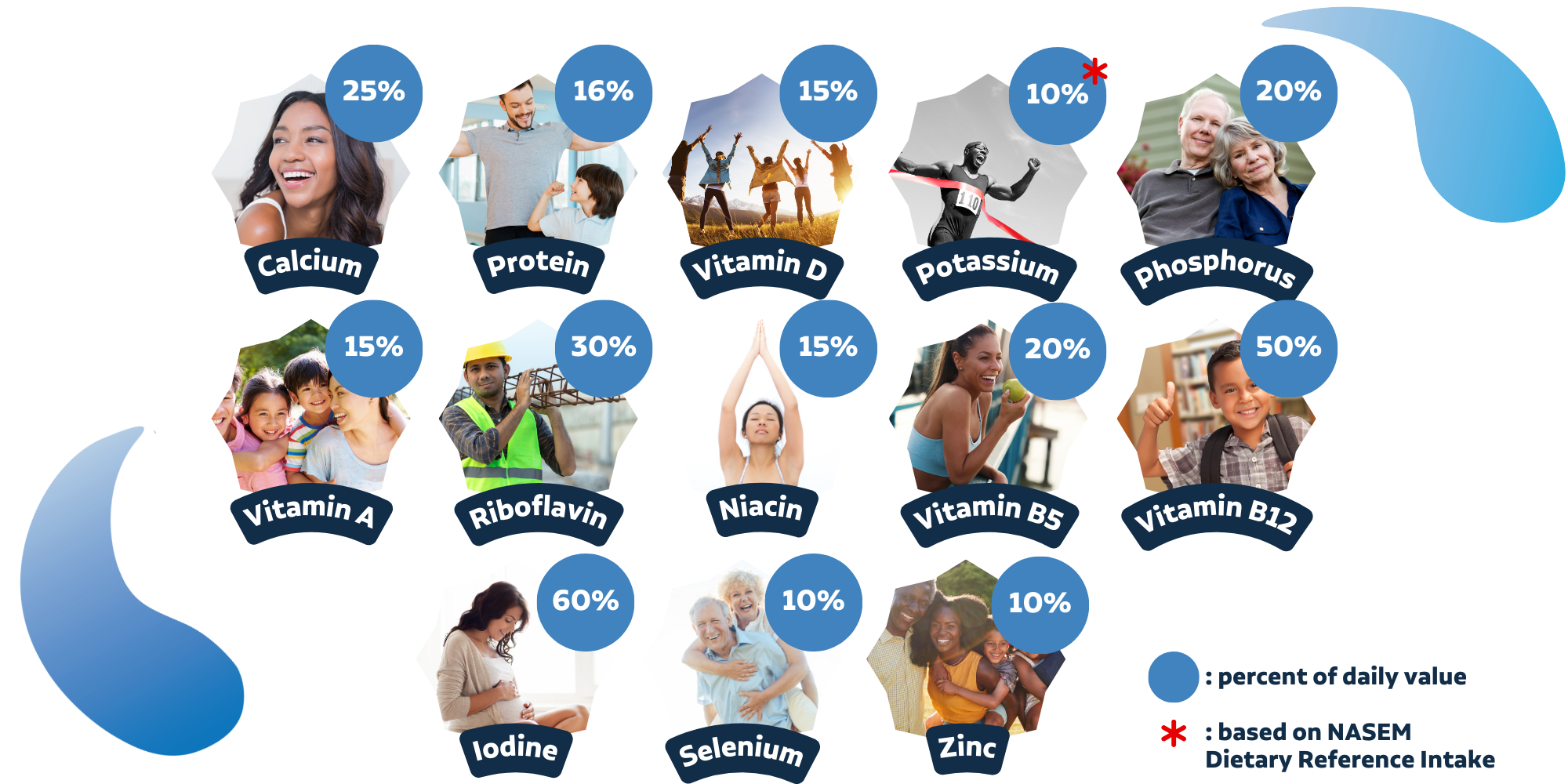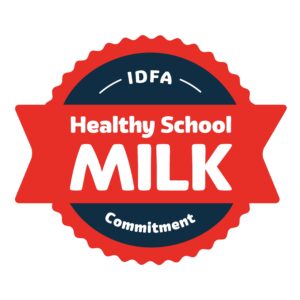From America’s heartland straight to your kitchen table, U.S. dairy products are wholesome, nutrient-dense superfoods. No matter your stage of life or daily demands, dairy products are simple, nutritious choices that fits every lifestyle. A cold glass of milk, a protein-packed yogurt, or a slice of cheese can provide the fuel you need to power through your day. Proudly made in the USA, dairy is more than just food—it’s a trusted tradition that nourishes families, strengthens communities, and keeps America moving forward.
Milk—and the dairy products it creates—provides 13 essential nutrients, including high-quality protein, calcium, vitamin D, and potassium. In fact, no other type of food or beverage provides the unique combination of nutrients that dairy contributes to the American diet. Here’s a look at the nutrition you’re getting from just one glass of milk:

Dairy products contain high-quality protein, meaning they provide all nine essential amino acids required for muscle growth, repair, and overall body function. This complete protein source is highly digestible and has a high biological value, allowing the body to efficiently absorb and utilize it. Casein and whey, the two primary proteins in dairy, support sustained muscle protein synthesis, making dairy particularly beneficial for athletes and individuals looking to maintain muscle mass. Additionally, dairy proteins contribute to satiety, bone health, and metabolic function, further enhancing their nutritional value.
According to the Dietary Guidelines for Americans, 2020-2025, Americans do not get enough calcium, vitamin D, potassium, and fiber. That's where milk and dairy products shine, providing 3 of the four "nutrients of concern":
Nutrition science has evolved in the past decade to show neutral or positive benefits of full-fat dairy foods such as whole milk, including less weight gain, neutral or lower risk of heart disease, and lower childhood obesity.
Dairy plays a vital role in a balanced, nutrient-rich diet, providing essential vitamins and minerals that support overall health. As the United States faces increasing concerns about chronic diet-related diseases and food insecurity, policies that promote the consumption of nutritious dairy products can help improve public health outcomes. Dairy products such as milk, cheese, and yogurt are rich sources of high-quality protein, calcium, and other key nutrients, making them a cornerstone of dietary recommendations. To maximize dairy’s contributions to public health, policymakers should focus on three priority areas: providing clear and science-based nutrition advice, ensuring children receive nourishing foods, and improving access to dairy for low-income families.
Nutrition guidance and labeling requirements play a key role in shaping how Americans craft a healthy diet around their own unique cultures, goals and preferences. It's clear that our current policies are not doing enough to relay the nutritional importance of dairy. The Dietary Guidelines for Americans (DGA) consistently recognize dairy as a core food group for its unique health benefits, yet many consumers are unaware of its health benefits, and 90% of Americans do not consume enough dairy products. The federal government has an opportunity in 2025 to improve these recommendations to better encourage Americans to consume enough dairy nutrition. At the same time, federal nutrition labeling policies—such as the recently finalized definition of “Healthy” and the recently proposed Front-of-Pack Nutrition Labeling scheme—do not do enough to communicate dairy’s positive contributions, including its role in bone health, muscle development, and overall well-being. Instead, these policies focus on "nutrients to limit" and give consumers only half of the story about their food choices. By ensuring that nutrition policies highlight the full benefits of dairy rather than focusing only on concerns about fat content or sugar, policymakers can better support informed consumer choices.

School meal programs provide a critical opportunity to nourish children with fresh, wholesome, nutrient-dense foods. However, current guidelines limit the availability of whole and 2% milk in school cafeterias, despite growing evidence of their benefits for children’s health and development. Reinstating whole and 2% milk through the Whole Milk for Healthy Kids Act of 2025 would provide students with greater access to the protein, calcium, and essential vitamins found in milk in a milk variety that they prefer to consume. Additionally, federal nutrition guidelines must avoid discouraging the inclusion of nutrient-rich dairy products—such as milk, cheese, and yogurt—in school meal programs. Ensuring that policies support, rather than restrict, these dairy foods will help improve childhood nutrition and foster lifelong healthy eating habits.

Expanding access to dairy products among low-income families is essential to addressing our nation's chronic food insecurity and improving health outcomes. Incentivizing Supplemental Nutrition Assistance Program (SNAP) participants to purchase a full range of dairy products—such as through initiatives like the Healthy Fluid Milk Incentives program and the Dairy Nutrition Incentive Program—can encourage healthier choices and improve dietary quality. At the same time, it is crucial to protect dairy benefits within the Special Supplemental Nutrition Program for Women, Infants, and Children (WIC). Significant cuts to milk and dairy benefits for WIC participants are scheduled to take effect in 2026. These cuts would reduce access to key nutrients for mothers and young children at a critical stage of growth and development. Policymakers must safeguard these benefits to ensure all families have the opportunity to include nutrient-rich dairy products in their diets.
The most recent Dietary Guidelines for Americans affirms that dairy is part of the ideal, healthy dietary pattern along with whole grains, legumes, fruits and vegetables. It's important that healthy foods like milk, cheese, yogurt and other dairy products be seen for their unique nutrient contributions to the American diet alongside fruits, vegetables, whole grains and legumes. Download The Healthy Five graphic to share on social media and in other communications.
Milk provides a unique combination of nutrients to American diets. Milk contains thirteen essential nutrients, including three of the four nutrients identified as dietary components of public health concern in the 2020-2025 Dietary Guidelines for Americans (DGA)—calcium, vitamin D and potassium. Milk provides 22% of the calcium, 40% of the vitamin D and 10% of the potassium in the American diet. In addition to these nutrients, milk is also a good source of protein, vitamin A and B vitamins, combining into a nutrient package not found in other foods or beverages. Read more about the nutritional benefits of milk here, and share information about milk's 13 essential nutrients using the graphics below.
Cheese is a flexible way to get a serving of nutrient-dense dairy: it can be a snack on its own or as part of an entrée or meal. Cheese is an important source of high-quality protein, especially for meat-free meals or snacks. In fact, cheese even included as a meat alternate in the school meal programs! And when cheese is visibly served with other nutrient-dense foods, like fruits, vegetables and whole grains, the consumption of those other heathy options is also increased. Read more about the nutritional benefits of cheese here.
Yogurt is a nutrient-dense food that is a good source of protein, calcium, riboflavin, vitamin B12, and phosphorous. Some yogurts have vitamin D added. Read more about the nutritional benefits of yogurt here.